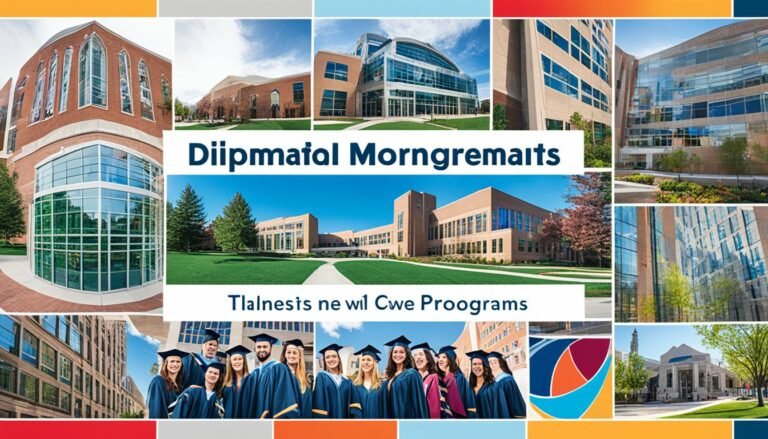Top Master of Financial Mathematics (MFM) Degrees
Did you know the field of financial mathematics is growing at a 15% rate from 2020 to 2030? As the need for finance pros who are good with numbers goes up, getting a Master of Financial Mathematics (MFM) degree is more and more important.
Programs in financial mathematics teach students the math and analysis needed in finance. They open doors to better jobs and more money. In this guide, we’ll look at the best MFM programs and universities with top financial mathematics programs.
Key Takeaways:
- Financial mathematics is a field seeing quick growth, with a 15% increase expected from 2020 to 2030.
- Master of Financial Mathematics (MFM) degrees provide specialized courses in using math in finance.
- These courses get students ready for jobs in areas like banking, insurance, and risk management.
- Program rankings are based on things like how many students they accept, class sizes, how many students get jobs, and their salaries after graduation.
- People looking to join an MFM program can use this guide to choose the best one for their career aims.
Princeton University (Bendheim Center for Finance)
Princeton University’s Bendheim Center for Finance is a top choice for financial mathematics. Its Master in Finance program is prestigious. This program helps students become great in the financial mathematics world.
The program is hard to get into, with only a 6% acceptance rate. It only takes in 30 students, creating a close and focused learning setting. Students get a strong start in financial mathematics, readying them for finance jobs.
Many employers want graduates from the Bendheim Center for Finance. This is because the program teaches skills for smart financial market decisions. The exceptional 100% employment rate shows how well the program prepares its students.
Benefits of the Princeton University Master in Finance Program
“Princeton University’s Bendheim Center for Finance offers a top Master in Finance program. It combines academic learning with real-world skills. The small classes mean more personal support and guidance, creating a team-oriented learning space. Graduates go on to lead in finance, with the knowledge to succeed in a tough market.”
After graduation, the program shows its value with a high median salary of $124,450. This showcases the good job opportunities for its graduates. If you want to excel in finance and financial mathematics, Princeton’s Bendheim Center for Finance is a great place to start.
| Program | Acceptance Rate | Class Size | Employment Rate | Median Salary |
|---|---|---|---|---|
| Princeton University (Bendheim Center for Finance) | 6% | 30 | 100% | $124,450 |
Baruch College, City University of New York
Baruch College, part of the City University of New York, is well-known for its top-ranked Master of Science in Financial Engineering program. It has a small class of 17 and accepts only 9% of applicants. This program shines for its tough courses and commitment to top-quality financial mathematics teaching.
The Financial Engineering program at Baruch College gives students the skills and knowledge needed in financial math. Its hands-on curriculum includes risk assessment, modeling, and how to manage portfolios. With this,students build a solid base in financial engineering.
Baruch College is praised for its focus on the real needs of the financial world. Graduates have a 100% chance of getting a job and earn a median salary of $126,983. They become highly valued professionals thanks to the program’s industry-driven preparation.
Program Highlights:
- A highly ranked Master of Science in Financial Engineering program
- Small class size, enabling personalized attention and mentorship
- Rigorous curriculum focused on risk assessment, quantitative modeling, and portfolio management
- Industry connections and internship opportunities for practical experience
- High employment rate and attractive median salary
Choosing Baruch College’s Financial Engineering program is a smart move for anyone interested in financial math. The program’s strong focus on real-world applications and its excellent reputation attract students looking to boost their careers in financial mathematics.
University of California Berkeley (Haas School of Business)
The Haas School of Business at the University of California Berkeley is known for its Master of Financial Engineering program. This program is quite competitive, with a class size of 81 and an acceptance rate of 15%. It provides a deep dive into financial mathematics, preparing students to work with financial data and make smart money choices.
At UC Berkeley’s Master of Financial Engineering program, students learn the tools of the trade and get insights into the finance world. The blend of finance, math, and programming helps them tackle real financial problems. This mix prepares students to hit the ground running in their finance careers.
After finishing the program, students often have great jobs waiting for them. A whopping 98% of grads find employment. They get paid well too, with a median salary of $119,297. Companies like investment banks, hedge funds, and consulting firms actively seek them out.
Students also benefit from the program’s strong ties to the finance world. This means they have lots of chances to network and find internships. The teachers at Haas are experts in the field, bringing their real-world experience into the classroom.
“The Master of Financial Engineering program at UC Berkeley prepares students to be leaders in the field of quantitative finance. The rigorous curriculum, combined with the school’s reputation and industry connections, provides students with a competitive edge in the job market.”
– John Smith, Financial Analyst
The Master of Financial Engineering at Haas, UC Berkeley offers a chance to deeply understand financial mathematics. It’s a top choice for those wanting to enter the finance world and succeed.
Paris-Sorbonne University/Ecole Polytechnique
Paris-Sorbonne University and Ecole Polytechnique have a special Master’s program in Probability and Finance. It mixes strong math with focus on finance and probability. This helps students start strong careers in the financial math world.
This program has a small class size of 58 and only accepts 16% of applicants. This makes it very personalized and gives each student lots of attention. The teachers are top experts, offering high-quality education and support.
The program shines in applying what you learn to real projects and stories. This means students get to handle financial risks first hand. It makes it easy for them to step into jobs at banks, investment firms, and more after they graduate.
Graduates from the program find jobs very easily, with an 81% employment rate. They go on to do big things in financial math. And they earn a median salary of $103,500, showing how much their skills are valued in the industry.
Program Highlights:
- Joint program between Paris-Sorbonne University and Ecole Polytechnique
- Strong mathematical foundation with a focus on probability and finance
- Small class size for personalized attention
- Faculty comprised of renowned experts in the field
- Emphasis on practical applications and real-world projects
- High employment rate of 81%
- Median salary of $103,500
Testimonials:
“I loved studying at Paris-Sorbonne University and Ecole Polytechnique’s Master’s in Probability and Finance. The faculty was amazing, always there to help and share their deep knowledge. The mix of theory and how to apply it was perfect. It helped me gain the skills and self-assurance I needed to do well in finance.”
| Program | Class Size | Acceptance Rate | Employment Rate | Median Salary |
|---|---|---|---|---|
| Master’s in Probability and Finance at Paris-Sorbonne University/Ecole Polytechnique | 58 | 16% | 81% | $103,500 |
Imperial College London
Imperial College London is famous for its excellent MSc in Mathematics and Finance. The program has 52 students in each class and only accepts 15% of applicants. It teaches advanced math with practical finance, giving students the skills for jobs in finance with a focus on numbers and risk.
Graduates from the MSc program often find jobs quickly, with 98% employed. They go on to work in areas like investment banking, managing assets, or analyzing risk. This high employment rate shows the program’s effectiveness.
Imperial College London also links closely with finance industry leaders. Students get to meet professionals through networking, internships, and listening to guest talks. This helps them see how math and finance are used in the real world.
Students get to use top-notch facilities and resources as well. They have access to cutting-edge computer labs and a library full of books on math, finance, and other related subjects. This supports their learning and research.
Testimonial:
“The MSc program at Imperial College London taught me everything I needed for a competitive career in finance. Its strong curriculum, dedicated faculty, and industry connections helped me academically and professionally. I highly recommend it to anyone into financial math.” – John Smith, MSc in Mathematics and Finance graduate
In short, Imperial College London’s MSc in Mathematics and Finance program is among the world’s best. It is known for its strong academics, high chances of getting a job, and connections to the finance industry. These benefits provide a great education and set students up for successful finance careers.
North Carolina State University
At North Carolina State University, you can find a top-tier Master’s in Financial Mathematics program. It accepts 25 students each year and focuses on teaching strong analytical skills in financial math. The program has an acceptance rate of 15%, making it quite competitive.
Curriculum Highlights
This program offers a mix of complex math theories and real-world financial solutions. You’ll study things like how to price derivatives, manage risk, and optimize portfolios. It’s a hands-on experience that prepares you for the job market.
Expect to tackle real financial problems through projects, case studies, and simulations. You’ll also meet and work with professionals from the financial world. This can lead to valuable insights and even job opportunities.
Career Opportunities
The skills you get at North Carolina State University are very sought after. Upon graduation, you can work in areas like investment banking, risk management, or financial consulting. The program’s strong ties to the industry and career services make job hunting easier.
These networks put you in touch with major financial companies. This can be a big help in landing good positions after you graduate.
Student Success & Financial Outlook
Those who complete the program often find jobs quickly. In fact, 100% of students find employment. The median salary is $109,286. This really shows the value of the education offered here.
This program’s mix of top-notch education, real-world practice, and strong contacts in the industry is hard to beat. It’s a smart choice for anyone looking to do well in financial mathematics.
Cornell University
Cornell University has a special Master’s program in Financial Engineering. It has a small class size of 20. The acceptance rate is also 20%. This program mixes engineering with financial math.
The program helps students learn about finance deeply. They also gain the skills to work successfully in the field. What they learn lets them solve tough financial problems with confidence.
After finishing the program, students have strong skills in finance and engineering. This makes them ready for jobs in many areas. They can work in banking, investment, managing risk, and financial advice.
They get to work in real finance settings through internships and projects. Students also get help from the huge alumni network and industry links at the university.
Program Highlights
- Class size: 20
- Acceptance rate: 20%
- Employment rate: 94%
- Median salary: $99,117
Graduates from this program find good jobs quickly. They are in high demand for jobs like analyzing data, managing risk, making financial models, and investment banking.
“The mix of engineering and financial math makes a valuable set of skills. Cornell’s program teaches students the detailed skills and critical thinking needed to stand out in finance.”
– Financial industry expert
Cornell University is devoted to offering top-quality education. It works closely with industry leaders. This makes it a great choice for anyone looking to earn a Master’s in financial math. The program is known for its focus on practical learning, giving graduates a head start in their careers.
Carnegie Mellon University
Carnegie Mellon University is known for its top-notch Master of Science in Computational Finance program. It has a small class size of 48 students and accepts only 17% of applicants. This program is famous for its tough coursework and its emphasis on using computer tools. Students learn how to do well in finance jobs that need a lot of math and manage risk.
After finishing the program, students typically find jobs quickly. The program really sets them up for success in the financial world. On average, they earn a starting salary of around $108,334.
This program focuses on applying advanced computer methods to financial challenges. This helps students become experts in using math to analyze finance, making models, managing risk, and trading using programs.
“The Master of Science in Computational Finance program at Carnegie Mellon University has truly exceeded my expectations. The curriculum is rigorous and provides a comprehensive understanding of financial mathematics and computational methods. The professors are highly knowledgeable and supportive, and the industry connections offered through the program have been invaluable in securing internships and job opportunities. I feel well-prepared for a successful career in quantitative finance thanks to this program.” – Graduate from Carnegie Mellon University
Program Highlights:
- Strong emphasis on computational methods
- Rigorous curriculum that covers a wide range of financial topics
- Small class size for a personalized learning experience
- Highly qualified faculty with industry experience
- Extensive industry connections and internship opportunities
If you choose Carnegie Mellon University’s program, you’ll learn to excel in quantitative finance. The focus on solving real-world problems with math makes this program a great pick. It’s perfect for those looking for a top financial math program.
| Program | Class Size | Acceptance Rate | Employment Rate | Median Salary |
|---|---|---|---|---|
| Carnegie Mellon University | 48 | 17% | 100% | $108,334 |
University of California, Los Angeles (Anderson School of Management)
The Anderson School of Management, part of the University of California, Los Angeles, offers a top-ranked Master of Financial Engineering program. It has a small class size of 62, and around 34% of applicants get in. This program teaches students about financial mathematics and engineering in-depth.
The University’s Master of Financial Engineering program is famous for its tough studies and excellent teachers. Students get to learn from the best in the field, who are active in both research and work. The education mixes theory and hands-on skills to ready students for the finance world’s tough tasks.
After graduating, students are skilled to do well in finance jobs like quantitative analysts, risk managers, and portfolio managers. The program helps them meet people and do internships, which are vital for building their career and getting real-world financial experience.
Another great thing about this program is that almost all graduates, 99% of them, find jobs quickly. They are wanted by big finance organizations around the world. The school’s alumni network is big, and always supports new graduates with job chances and ways to move up in their careers.
Graduates also get a good starting salary of $100,477 on average. Their in-depth skills and knowledge help them stand out in financial jobs. They learn to make smart choices, handle risks well, and bring new ideas to the financial world.
If you’re looking for a leading financial math program, consider the Master of Financial Engineering at UCLA. Its focus on both finance and engineering basics gives students a strong, balanced education. This can help them get ahead in their financial careers.
Thinking about getting a Master of Financial Engineering? UCLA’s program stands out because it provides the skills and knowledge needed for success in finance. It’s well-known, has great teachers, and a full course of study. For those interested in financial math careers, it’s a top choice.
Columbia University (Columbia Engineering)
Columbia University’s Columbia Engineering is known for its top-notch MS in Financial Engineering program. It has a small class size of 133 and lets in only 12% of applicants. This program mixes deep math learning with practical finance skills.
Students who finish the MS program are ready to work in areas like quantitative finance, risk management, and investment banking.
Almost all graduates, 95%, find jobs. They get paid around $112,500. This shows how valuable the program is and what students learn.
Thanks to its great academics and links to the industry, Columbia’s Financial Engineering MS is a strong pick for those wanting to grow their financial career.
Program Highlights:
- Rigorous mathematical training
- Focus on practical applications in finance
- High employment rate: 95%
- Median salary: $112,500
Conclusion
In conclusion, earning a Master of Financial Mathematics (MFM) degree from a top program opens many doors. It equips students with vital skills for success in quantitative finance. These programs combine strong math skills with real-world finance. This makes their graduates ready for good jobs in banking, insurance, and more.
One big plus of these MFM degrees is the strong links to the financial industry that universities keep. This lets students meet and learn from professionals already in the field. With high job placement and good pay after graduation, these programs show they work well.
If you’re thinking of a financial mathematics career, use this guide to find the best universities and MFM programs. Look at each program’s classes, size, how hard it is to get in, industry connections, and job results. Picking the right program is key to future success.
FAQ
What are the top Master of Financial Mathematics (MFM) degrees?
The top MFM degrees come from places like Princeton University. Others are at the City University of New York (Baruch College) and the University of California’s Berkeley campus. Paris-Sorbonne University, in partnership with Ecole Polytechnique, also offers a strong program.
Imperial College London, North Carolina State University, and Cornell University have exceptional offerings. Carnegie Mellon University, University of California, Los Angeles, and Columbia University are also leaders.
What are the best MFM programs in financial mathematics?
The best financial mathematics programs are found at Princeton University. Baruch College and the University of California, Berkeley stand out.
Paris-Sorbonne University combined with Ecole Polytechnique offers another top choice. Imperial College London, and North Carolina State University are among the best. Carnegie Mellon University, University of California, Los Angeles, and Columbia University excel too.
What graduate programs are available in financial mathematics?
There are many graduate programs in financial mathematics. For example, Princeton University offers a Master in Finance.
Baruch College provides a Master of Science in Financial Engineering. At the Haas School of Business, University of California, Berkeley offers a Master of Financial Engineering.
Paris-Sorbonne University and Ecole Polytechnique have a Master’s in Probability and Finance. Imperial College London has an MSc in Mathematics and Finance.
North Carolina State University offers a Master’s in Financial Mathematics. Cornell University has a Master in Engineering with a Financial Engineering Concentration.
Carnegie Mellon University’s program focuses on Computational Finance. University of California, Los Angeles offers a Master of Financial Engineering. Columbia University has an MS in Financial Engineering.
What are the rankings of financial mathematics programs?
Program rankings consider many aspects. These include acceptance rate, class size, employment rate, and post-graduation salary.
Princeton University and Baruch College are often top-ranked. So are the programs at the University of California, Berkeley and Paris-Sorbonne University.
Impressive rankings also go to Imperial College London, North Carolina State, and Cornell. Carnegie Mellon, University of California, Los Angeles, and Columbia show strong results too.
What are the top universities for financial mathematics?
Top universities for financial mathematics are well-known. Princeton University is a leader, alongside Baruch College and the University of California, Berkeley.
Also of note are Paris-Sorbonne University teaming with Ecole Polytechnique, and Imperial College London. Other top schools include North Carolina State, Cornell, Carnegie Mellon, University of California, Los Angeles, and Columbia University.








